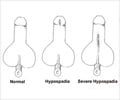Exposure to hairspray during pregnancy could double risk of genital defect in child, study shows.
Exposure to hairspray during the first trimester of pregnancy at the workplace could more than double risk of a genital defect in the male child. It is a defect called hypospadias, in which the opening of the urethra is on the underside of the penis, instead of at the tip. The urethra is the tube through which urine drains from the bladder and exits the body.
The study by researchers from Imperial College London, University College Cork and the Centre for Research in Environmental Epidemiology in Barcelona. suggests that hairspray and hypospadias may be linked because of chemicals in hairspray known as phthalates. Previous studies have proposed that phthalates may disrupt the hormonal systems in the body and affect reproductive development.It is thought that hypospadias affects around 1 in 250 boys in the UK and in the USA, although estimates about prevalence vary. Usually, hypospadias can be successfully treated with corrective surgery after a boy reaches his first birthday, but more severe cases can lead to problems with urinating, sexual relations and fertility.
The new research also reveals that taking folic acid supplements in the first three months of pregnancy is associated with a 36 percent reduced risk of bearing a child with the condition. The UK Department of Health already recommends that folic acid supplements are taken up until the twelfth week of pregnancy in order to prevent neural tube defects such as spina bifida.
Previous smaller studies had suggested that hypospadias might be linked to vegetarianism but the new study did not show any increased risk in women who had a vegetarian diet during pregnancy.
Professor Paul Elliott, the corresponding author of the research from the Department of Epidemiology and Public Health at Imperial College London, said: "Hypospadias is a condition that, if left untreated, can cause problems in later life. Although surgery to correct it is usually successful, any surgery will be traumatic for the child and his parents. It is encouraging that our study showed that taking folic acid supplements in pregnancy may reduce the risk of a child being born with the condition. Further research is needed to understand better why women exposed to hairspray at work in the first 3 months of pregnancy may have increased risk of giving birth to a boy with hypospadias."
The researchers reached their conclusions after conducting detailed telephone interviews with 471 mothers whose sons had been referred to surgeons for hypospadias and 490 controls, across 120 London Boroughs and Local Authority Districts.
Advertisement
The study was funded by a grant from the UK Health and Safety Executive, the Department of Health, the Department of the Environment, Transport and The Regions and the European Chemical Industry Council.
Advertisement
GPL/S












